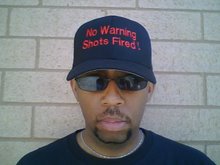Nearly seven years ago, on September 11, 2001, an event happened that would shape American policy for decades to come. The event was the attack on the World Trade Center and Pentagon which had Americans looking under every rock and behind ever bush for terrorists. No piece of legislation developed under the pretense of a "war on terror" was too much as long as it allowed citizens to sleep at night. Years later, most would agree, in retrospect, that both the Patriot Act and the Iraq War were dreadful mistakes. Unfortunately, with the NC Street Gang Suppression Act, history seems to be repeating itself.
Don't get me wrong, I like going to get my newspaper out of the driveway every morning without becoming the victim of a drive by as much as the next guy but I believe that the "Hip Hop Patriot Act" is leading us down a long dark path better left untraveled.
I would be the first to admit that Durham like other cities, has a problem with youth violence. However, the gang threat has been blown out of proportion by the media, politicians and others who have various motives for promoting the idea of the great red and blue menace that is supposedly plaguing the streets of Durham and other cities in North Carolina .
While Durham may not be "Mayberry USA", it ain't Compton either. The same kid who is Killer P while hanging on the block with his homies on Friday night is Lil Pookie who sings in the junior choir on Sunday morning.
Thus, the main problem with the new anti gang bill is its failure to clearly define what constitutes being a member of a gang. Now, I'm no lawyer but I have watched Law and Order enough times to know that this bill could lead to unfair profiling and constitutional violations. Just because someone wears an over sized white T-Shirt and has a tattoo of Bugs Bunny on his right shoulder does not make him a criminal.
Every since the mega corporations have discovered that "gangsta chic" is a billion dollar a year industry, they have promoted gangsterism as part of Hip Hop culture. It is not the kids on the street who are making millions of dollars promoting the gangsta style but the owners of major clothing. jewelry and advertising companies.
While some may disregard the fear of Hip Hop profiling, this is a real concern, especially for a black community not too far removed from the Jim Crow Laws and Black Codes of the early 20th century that made it illegal for a group of African Americans to gather on street corners.
While the term "gang" member is not race specific, the poster child of gangsterism as promoted by the media is not a middle class white kid selling meth nor a skinhead with a Confederate cap but a young black male with a bandanna and sagging pants. So in an attempt to ease public fear this is to whom the bill will be targetted.
Also, although the proposed legislation is being sold as a way to get the top shot callers of the gangs, I doubt very seriously if much of the energy actually goes towards finding who actually brings the drugs into the community. As usual, the politicians will turn a blind eye to the root causes of crime such as the stores that sell a disproportionate amount of high octane liquor in high crime areas as well as the easy access to guns in these communities. This is because those who put the guns and liquor into these communities have lobbyists and the gang bangers don't.
The reason that we cannot solve the so called gang issue is that there are some who have already made plans to send their children to college courtesy of the money that "gang prevention" laws generate. There is always a long line of poverty pimps and Hip Hop hustlers standing in line to gobble up government funds, many of whom won't even tell an "urban child" good morning unless there is a grant tied to the salutation.
The challenge is for to come up with new ways to stop youth violence without caving in to the politics of fear and ignorance.
As Stevie Wonder once sang, "when you believe in things that you don't understand, then you suffer."
Minister Paul Scott is founder of the Messianic Afrikan Nation in Durham.

